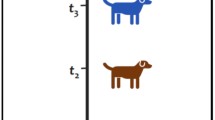Abstract
What distinguishes a whole from an arbitrary sum of elements? I suggest a temporal and causal oriented approach. I defend two connected claims. The former is that existence is, by every means, coextensive with being the cause of a causal process. The latter is that a whole is the cause of a causal process with a joint effect. Thus, a whole is something that takes place in time. The approach endorses an unambiguous version of Restricted Composition that suits most commonsensical intuitions about wholes.







Similar content being viewed by others
References
Bigelow J, Pargetter R (2006) Real works for aggregates. Dialectica 60(4):485–503. doi:10.1111/j.1746-8361.2006.01084.x
Casati R, Varzi A (1994) Holes and other superficialities. MIT Press, Cambridge
Cohen J (2007) A relationalist’s guid to error about color perception. Nous 41(2):335–353. doi:10.1111/j.1468-0068.2007.00650.x
Davidson D (1969/1980) The individuation of events. In: Davidson D (ed) Essays on action and events. Blackwell, Oxford, pp 163–180
Dennett DC (2003) Freedom evolves. Penguin Books, London
Dowe P (2000) Physical causation. Cambridge University Press, New York
Eddington AS (1929/1935). The nature of the physical world. MacMillan, New York
Ehring D (1986) The transference theory of causation. Synthese 67:249–258. doi:10.1007/BF00540071
Ehring D (1998) Causation and persistence. Oxford University Press, Oxford
Einstein A (1916/2001) Relativity. Routledge, London
Honderich T (1988) Mind and brain: a theory of determinism. Clarendon Press, Oxford
Hudson H (2003) Alexander’s dicta and Merrick’s dictum. Topoi 22:173–182. doi:10.1023/A:1024982323463
Kim J (2005) Physicalism or something near enough. Princeton University Press, Princeton
Kreiman G, Koch C et al (2000) Imagery neurons in the human brain. Nature 408:357–361. doi:10.1038/35042575
Lewis D (1986) On the plurality of worlds. Blackwell, London
Lewis D (ed) (1991) Parts of classes. Blackwell, Oxford
Libet B (1987) Consciousness: conscious, subjective experience. In: Adelman G (ed) Encyclopedia of neuroscience. Birkhauser, Boston, pp 271–275
Libet B (2004) Mind time. The temporal factor in consciousness. Harward University Press, Cambridge
Manzotti R (2006a) An alternative process view of conscious perception. J Conscious Stud 13(6):45–79
Manzotti R (2006b) Consciousness and existence as a process. Mind Matter 4(1):7–43
Manzotti R (2008) A process-oriented view of qualia. In: Wright E (ed) The case for qualia. MIT Press, Cambridge, pp 175–190
Manzotti R (2009) Does process externalism entail panpsychism? In: Skrbina D (ed) Minds that abides. Panpsychism in the new millenium. John Benjamins Pub, Amsterdam, pp 201–220
Merrick T (1999) Persistence, parts and presentism. Nous 33(3):421–438. doi:10.1111/0029-4624.00162
Merrick T (2001) Objects and persons. Oxford Clarendon Press, Oxford
Nolan D (2006) Vagueness, multiplicity and parts. Nous 40(4):716–737. doi:10.1111/j.1468-0068.2006.00630.x
Rees G, Kreiman G et al (2002) Neural correlates of consciousness in humans. Natl Rev 3:261–270. doi:10.1038/nrn783
Reichenbach H (1958) The philosophy of space and time. Dover, New York
Russell B (1948) Human knowledge, its scope and limits. Simon & Schuster, New York
Salmon W (1984) Scientific explanation and the causal structure of the world. Princeton University Press, Princeton
Salmon W (1998) Causality and explanation. Oxford University Press, New York
Sider T (2001) Four dimensionalism. An ontology of persistence and time. Oxford Clarendon Press, Oxford
Sider T, Braun D (2007) Vague, so untrue. Nous 41:133–146. doi:10.1111/j.1468-0068.2007.00641.x
Simons PM (1987) Parts. A study in ontology. Clarendon Press, Oxford
Skinner BF (1953) Science and human behaviour. MacMIllan, New York
Smith B (1996) Mereotopology: a theory of parts and boundaries. Data Knowl Eng 20:287–303. doi:10.1016/S0169-023X(96)00015-8
Smith B, Welty C (2001) Ontology: towards a new synthesis. FOIS, Ogunquit
Van Inwagen P (1990) Material beings. Cornell University Press, New York
Varzi A (1996) Parts, wholes, and part-whole relations: the prospects of mereotopology. Data Knowl Eng 20:259–286. doi:10.1016/S0169-023X(96)00017-1
Varzi A (2003) Perdurantism, universalism, and quantifiers. Australas J Philos 81(2):208–215. doi:10.1080/713659632
Whitehead AN (1929/1978) Process and reality. Free Press, London
Zeki S (1978) Functional specialization in the visual cortex of the rhesus monkey. Nature 274:423–428. doi:10.1038/274423a0
Zeki S, Bartels A (1998) The asynchrony of consciousness. Philos Trans R Soc Lond B Biol Sci 265:1583–1585. doi:10.1098/rspb.1998.0475
Zeki S, Moutoussis K (1997) Temporal hierarchy of the visual percetive systems in the Mondrian world. Philos Trans R Soc Lond B Biol Sci 264:1415–1419. doi:10.1098/rspb.1997.0197
Author information
Authors and Affiliations
Corresponding author
Rights and permissions
About this article
Cite this article
Manzotti, R. No Time, No Wholes: A Temporal and Causal-Oriented Approach to the Ontology of Wholes. Axiomathes 19, 193–214 (2009). https://doi.org/10.1007/s10516-009-9067-2
Received:
Accepted:
Published:
Issue Date:
DOI: https://doi.org/10.1007/s10516-009-9067-2




